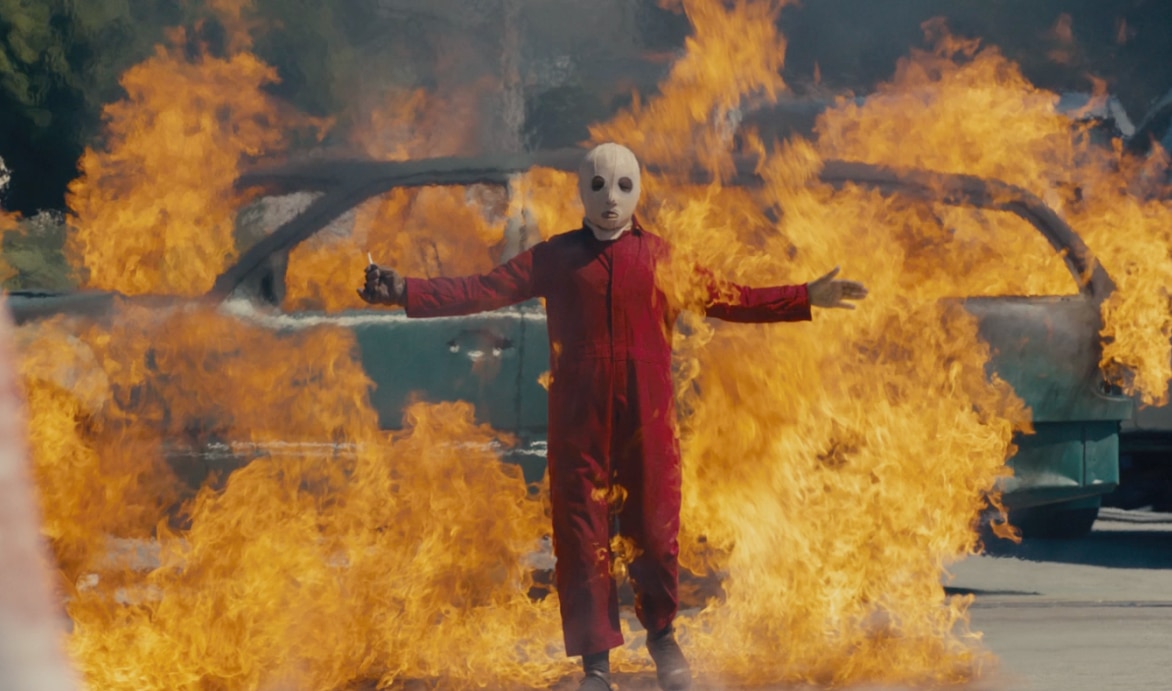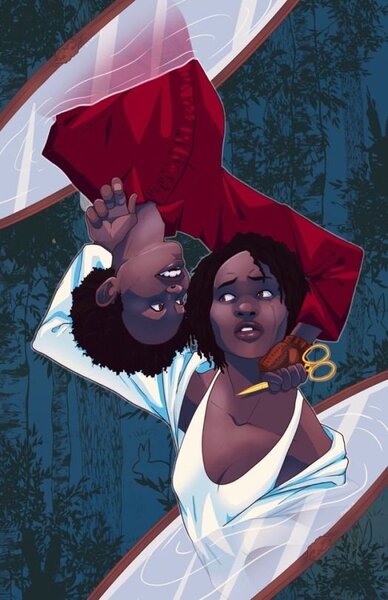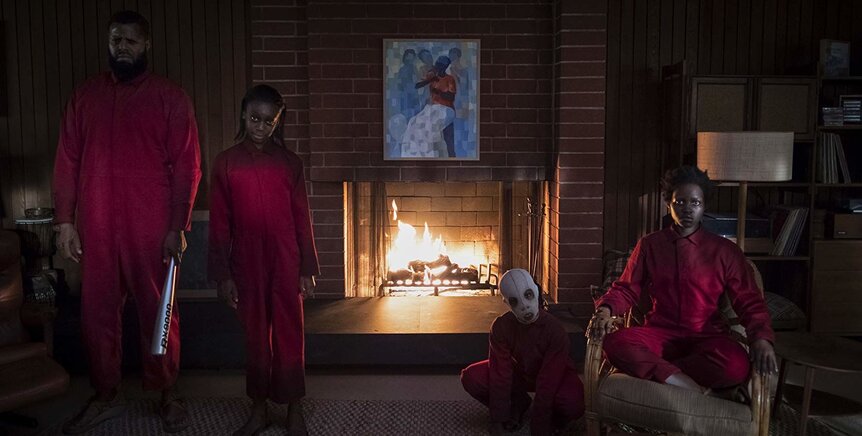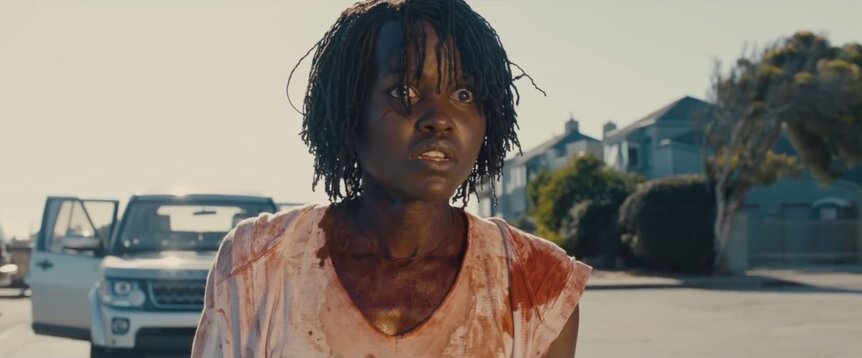Create a free profile to get unlimited access to exclusive videos, sweepstakes, and more!
Us and the tethering of the parent-child relationship

If it wasn’t evident after Get Out, Jordan Peele is a master storyteller. Us is a film that stays with you well after the credits roll and the lights come up. It has an extended release effect, benefiting from multiple watches and giving the viewer many interpretations. One of its many takeaways is how the film presents parenthood, specifically motherhood.
Spoilers below for Us.
The story of Us perhaps doesn't happen if not for Adelaide’s (Lupita Nyong'o) inattentive father (Yahya Abdul-Mateen II). Her mother (Anna Diop) urges him to keep an eye on Adelaide while she steps away, but he doesn’t. Thanks to both actors, this moment feels as though it's clearly a recurring issue within their family. Adelaide ends up walking off, as most young children do, and ends up in the funhouse, where she encounters her other. It's revealed toward the close of the film that the original Adelaide never makes it out of that funhouse — her clone does. Her mother believes that the trauma of whatever transpired has left her speechless, but as we learn, this Adelaide doesn’t talk because she can’t.
Adelaide's mother, at the advice of the therapist, does everything she can — everything her husband is unwilling to do — to help her little girl get back to being who she was before, pouring all the love and attention into the clone version of Adelaide, who blossoms to the grown Adelaide we meet in the film. Meanwhile, the original Adelaide is trapped with the other clones, never receiving any of the love and attention her real mother has now thrown into her clone. This is significant for both Adelaides. We get to see a true nature-versus-nurture situation play out.
Clone Adelaide is the product of her mother's nurturing, while the original Adelaide, the one we know as Red, is both the result of her father’s neglect and the nature of having to raise herself in those bunkers. Not only are the two of them connected to one soul, but they are also both connected to the original set of parents. This affects how both of them mother their children. When the two finally cross paths again, Red has her own family, a distorted version of Adelaide’s. Red tells a story that starts off like a fairy tale but quickly turns into a nightmare, recounting the truth that everything Adelaide has done in her life, Red has experienced as well, but in a twisted way. Red doesn’t care for her children in the way that Adelaide does. She treats them like animals, especially the youngest, Pluto, who is the reflection of Adelaide’s youngest, Jason (Evan Alex). Who could really blame her for feeling that way toward a family she didn't choose? It's complicated, but it's not difficult to sympathize with Red as a result.Red seems to have a neglectful nature herself, certainly due to raising herself among the clones, but perhaps also from her experiences with her parents prior to that night at the funhouse.Adelaide very much loves and cares for her children. Before things go to hell, she tells Jason to stay with her and she’ll keep him safe. There are many ways to interpret this scene, but speaking specifically about how Adelaide was raised by Red’s mother, protection is something that was probably ingrained in her. One can only imagine how protective her mother became after the incident at the beach, and Adelaide reflects that in her care of her own children, as well as Red’s. If mothers can share a special soul tie with their children and the clones share a soul with their originals, this explains some of Adelaide’s empathy toward Red’s children. These children would be hybrids themselves, and who truly knows what kind of effects this has on them as well as their mothers.
When Adelaide's daughter Zora (Shahadi Wright Joseph) kills her doppelganger by sending her flying into some trees, Adelaide gets out of the vehicle to go check. As the Zora doppelganger dies, there is a hint of grief expressed by Adelaide. She extends empathy toward the doppelganger as she succumbs to her injuries, making one wonder whether this empathy comes from a place of understanding because Adelaide herself is a clone too — or does it go deeper than that? Is she somewhat connected to this child in the way that she is connected to her own children, as mothers often are? She didn’t give birth to them, but through her connection to Red, these children are still connected to her. She feels that.
She extends this same empathy but with more urgency when Jason's doppelganger, Pluto, walks back into the fire. She screams out for him in the way that she would have for her own son. Keep in mind, this entire time, her husband Gabe (Winston Duke) hasn’t shown any kind of feelings toward these children, which makes sense — they are trying to kill them. However, Jordan Peele may have been trying to say something more than that. Goofy aloof dads have caused more than their fair share of trouble in Us, from Adelaide's father to Tim Heidecker's character, Josh, who just couldn't be bothered when his wife asked him to investigate a noise coming from outside their house.
Gabe isn’t tied to the children in the way Adelaide is. The relationship between children and their fathers is different from mothers and their children. This goes back to how Red’s dad was so unwilling to deal with his daughter being different following the night she walked off. Her mother picked up on the changes in her daughter, knowing something wasn’t right. This was not the child she knew before.
On the flip side, Red isn’t even tied to her own children. Perhaps, along with the trauma, she's taken on the qualities of her father. She sends her children off like attack dogs, saying absolutely nothing when her own son walks into the fire, killing himself. So maybe the strength in maternal and paternal ties are affected by how one was raised.
These ties go both ways too. Jason soon figures out the truth, that his mother is the clone and Red is the true Adelaide. He senses something is off with her after she kills the cloned twin but says nothing. Even after having that truth confirmed thanks to Red revealing Adelaide’s secret before the two face off, he remains silent about it. As the family rides away in the ambulance, Jason and Adelaide share a moment between mother and son. Jason puts his mask down, like an acceptance that he was ready to protect his mom in the same way she protected him. Regardless of Adelaide being the clone, she is still his mother, their connection deepened by her care and protection of him.Us presents an opportunity to look at the ties between mother and child, father and child, and nature-versus-nurture's implications for all of them. One thing is for sure, and that’s the fact that Us is full of rabbit holes to fall down. Good luck, and enjoy getting lost in them.





























